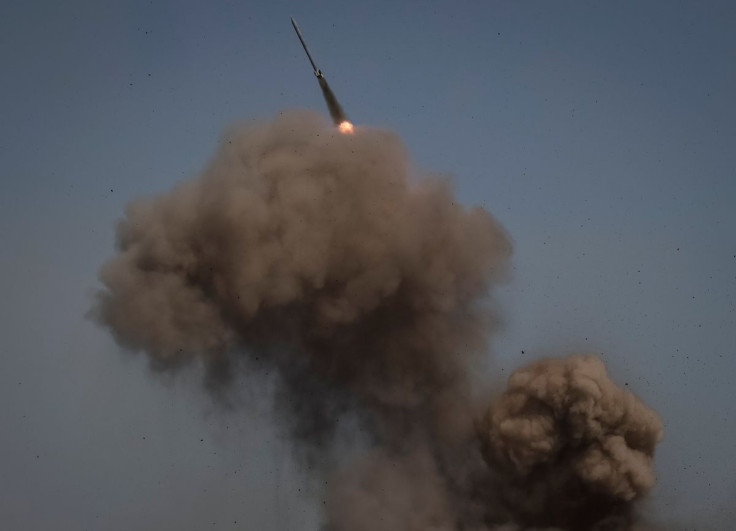Putin Warns Of Long War As West Seeks To Unblock Ukraine's Grain Exports

Western officials on Friday tried to coax Russia into allowing Ukraine to ship its grain out to the world as the four-month-old war threatened to bring hunger to countries far away from the battlefields.
Moscow for its part accused the West of waging economic warfare on Russia by attempting to isolate it with sanctions imposed over the Feb. 24 invasion.
President Vladimir Putin warned that Russia's military operations in Ukraine had barely got started and the prospects for negotiation would grow dimmer the longer the conflict dragged on.
On the frontlines in Ukraine's eastern Donbas region, officials reported continued Russian shelling of towns and villages ahead of an anticipated new push to grasp more territory.
"NOT YOUR COUNTRY"
At a meeting of G20 foreign ministers in Bali, Indonesia, some of the staunchest critics of the Russian invasion confronted the Kremlin's top diplomat Sergei Lavrov.
High on their concerns was getting grain shipments from Ukraine out of blockaded Black Sea ports. Ukraine is a top exporter and aid agencies have warned that countries in Africa, the Middle East and elsewhere face devastating food shortages if supplies do not reach them.
At a plenary session, U.S. Secretary of State Antony Blinken urged Moscow to let Ukrainian grain out to the world, a Western official said.
"He addressed Russia directly, saying: 'To our Russian colleagues: Ukraine is not your country. Its grain is not your grain. Why are you blocking the ports? You should let the grain out,'" the official said.
Earlier, Lavrov had berated the West, saying that instead of focusing on how to tackle global economic problems at the meeting, ministers had embarked on "frenzied criticism" of Russia over the Ukraine conflict.
Ukraine's foreign minister, in a virtual address to the meeting, said Russia had no place at any international gathering. Dmytro Kuleba said the international community should not allow Russia to blackmail the world with high energy prices, hunger and security threats, according to a statement from his office.
The meeting's host, Indonesian Foreign Minister Retno Marsudi, said the repercussions of the war, including rising energy and food prices, would hit poor countries the hardest.
Reintegration of Ukraine and Russia's grain and fertilizer into supply chains was critical, she said.
"It is our responsibility to end the war sooner than later and settle our differences at the negotiating table, not at the battlefield," Retno said at the opening of the talks.
Ukrainian President Volodymyr Zelenskiy, in a remote address to Slovenia's parliament on Friday, said food shortages would lead to increased migration to Europe in what he saw as part of a Russian plan to destabilise the continent.
"Russia is blocking our ports, preventing the transportation of grain. Famine will cause large migration flows in the future. Because of this, we are working to save the countries of Africa, and the Middle East and try to feed these people," he said.
"DYING IN HOUSES"
Putin's comments in Moscow indicated that the prospects of finding a solution to the conflict were dim right now.
"We have heard many times that the West wants to fight us tothe last Ukrainian. This is a tragedy for the Ukrainian people,but it seems that everything is heading towards this," Putin said in a speech to parliament on Thursday.
On Friday, Kremlin spokesman Dmitry Peskov reiterated that bullish stance, saying Russia had used only a small portion of its potential in its Ukraine operation.
The biggest conflict in Europe since World War Two has killed thousands, displaced millions and flattened Ukrainian cities.
Russia calls it a "special military operation" intended to degrade Ukraine's military and root out people it sees as dangerous nationalists. Ukraine and its Western allies say Russia is engaged in an unjustified land grab.
After failing to quickly take the capital Kyiv, Russia is now waging a war of attrition in Ukraine's industrial heartland of the Donbas, made up of the regions of Luhansk and Donetsk.
On Sunday, Moscow declared it had "liberated" Luhansk and now plans to capture parts of neighbouring Donetsk it does not control.
Luhansk governor Serhiy Gaidai said on Friday Russian forces were indiscriminately shelling villages, towns and cities.
"They are not stopped even by the fact that civilians remain there, dying in houses and yards. They hit houses, every building that seems to them a possible fortification," he said.
The situation was similar in settlements in Donetsk.
Vadym Lyakh, the mayor of Sloviansk, said a woman was killed overnight when Russian shelling hit a residential building.
Reuters could not independently verify the battlefield accounts.
Britain's defence ministry said Russian forces were likely to be pausing to replenish before undertaking new offensive operations in Donetsk. Russia's immediate tactical objective might be Siversk, a small industrial city in the north of Donetsk, it said.
But Luhansk governor Gaidai said: "There is no operational pause and there is no decrease in shelling - they are throwing more and more new units into battle."
© Copyright Thomson Reuters 2024. All rights reserved.





















